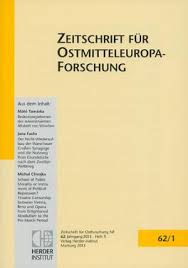Wider die „angeborene und nationale Mission der Frau“? Gesellschaftliche Auseinandersetzungen um Abtreibungen in Polen seit der Entstalinisierung
Against the “Women’s Inherent and National Mission”? Social Debates about Abortions in Poland since De-Stalinization
Author(s): Michael ZokSubject(s): Christian Theology and Religion, Ethics / Practical Philosophy, Health and medicine and law, Post-Communist Transformation
Published by: Verlag Herder-Institut
Keywords: Poland; abortion; reproductive rights; reproduction; (post-)Communism; Catholicism;
Summary/Abstract: The article aims to give an insight into the different discourses on abortion that raged in Polish society from the beginnings of the De-Stalinization until the end of the twentieth century. Two periods of time are considered most important: the years around 1956, when the law underwent quite a liberal reform allowing women to undergo a procedure—outside of a criminal context—for social reasons, e.g. housing problems, the number of children a woman had, or socio-economic hardships. This liberalization led to outrage within the ranks of the Catholic hierarchy as well as between members of Catholic lay organizations. Especially high-ranking members of the hierarchy, such as Cardinal Stefan Wyszyński, tried to use their “moral power” to influence people, women in particular, to decide against abortion, as well as medical personnel (doctors, nurses etc.) to refuse to perform them. In their opinion, abortion was murder and would therefore be instrumental in annihilating the Polish nation. For this reason, the Church and its lay organizations attacked the state and the Communist party for “their law” of 1956 from that moment on. In the 1970s, this offensive gained intensity and led to a discursive shift: the term “unborn child” dominated the discourse (instead of the commonly used “fruit of the womb” or “foetus”). Communist party members were furious about the harsh critique by the Church and defended the law because it was, in their opinion, the only option. Because of the short supply and low quality of contraceptives during the Communist era, the induced termination of a pregnancy remained the most common “contraceptive.” The second important period of time considered in this article were the years of Communist breakdown and the beginning of the subsequent transformation. The erosion of Communist power led to attempts—headed by Catholic politicians who were gaining in numbers and prominence in the late 1980s—to embed the anti-abortion political agenda into politics and law.
Journal: Zeitschrift für Ostmitteleuropa-Forschung
- Issue Year: 68/2019
- Issue No: 2
- Page Range: 249-278
- Page Count: 30
- Language: German

